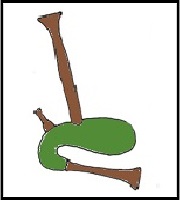The History of Lincoln Waites
Mr Skelton - Waite 1762-1768
1719
According to the Rolls of Sacrament (Lincoln City Rolls and Parcels/Box 14/188) George Skelton was a Woolendraper in 1719 and served as Sheriff in that same year.
12 April 1762
- "A Calendar for a Wait in the Room of Wm. Wigley - deceased.
- Mr Skelton, unanimously elected."
- (ref: L1/1/1/7, p442)
Later in 1762 Skelton's name is recorded in the Mayor's Accounts when his salary as a Wait is paid: "Paid to George Crathorne, William Roberts, George Kerton, George Skelton for One Years Salary due to them as Citty Waits at Michaelmas 1762 - £7.7s" (Lincoln City Rolls 14/1761-1762).
In 1756, William Wigley had been chosen as a Wait, in preference to one George Skelton - this could be the same Skelton who, 6 years later, took his place as a Wait after Wigley's death.
31 May 1768
Skelton only served as a Wait for six years before his death. His place was then taken by Thomas Curtois:
- "A Calendar for one of the Waits in the Room of Mr Skelton deceased -
- Mr Dickinson 10 voices
- Thomas Curtois 21 Elected."
- (L1/1/1/7, p511)
The 'Skelton' name has a long association with Lincoln Corporation - in 1696 another George Skelton was "sworne an Alderman" (Lincoln City Minute Book, 1655 – 1710, L1/1/1/6, P329).
7 August 1790
In 1790, Ann Frawley or Trawley, wrote her will. She left some items to Joseph Skelton, her nephew, and she left various household items, table cutlery, clothing, and £110 to Ann Skelton, her niece. However, the biggest share of her wealth was left to George Skelton: "to my nephew George Skelton, [this George may have been a relative of Skelton the Wait, possibly a son or nephew] all my estate lands, tenements and hereditaments held by lease from the Mayor, Aldermen and Commonality of the City of Lincoln, now in the occupation of Mr Alderman Dell and Mr Thomas Drury." (Hill 42/4/30).
Interestingly, the two men occupying these houses were both Council members - Joseph Dell was one of the Keepers of the Keys [of the corporation bond boxes] and John Drury was one of the Coroners. (L1/1/1/7, p891, 30 September 1799).
Later we find records of Thomas Skelton (possibly related to Skelton the Wait). Thomas, a "victualler" was declared a Freeman in 1799, for which liberties the corporation levied a charge of £20. (L1/1/1/7 - 1799, p905). Later that year Thomas was included in "The Great Court Leet" together with John Smith. (L1/1/1/7, p891 - 30 September 1799).
Skelton "of the Magpies" provided wine for the Assizes in 1802 and was paid £1.10s by the corporation (l1/4/1/2). The Magpies may have been the Inn standing in Magpie Square. There is still a 16th century Merchants House on that spot today, which is used as a public house: the Green Dragon.
In 1807, Thomas Skelton announced his departure from the Magpies Inn, thanking all his customers and inviting them to visit him in his new job as licensee of the Spread Eagle Inn, Lincoln. The Magpies Inn stood close to the Swing Bridge (now Thornbridge) and gave its name to Magpie Square (the stretch of road near Thorngate House is still named so, although no longer a square) (ref: "Lincoln, Rutland & Stamford Mercury", 20 Nov 1807).
A man named George Skelton was elected as a "Common Councilman" in June 1656 (L1/1/1/6, page 51) and again in May 1658 (L1/1/1/6, page 69). George Skelton farmed at the Belton Estate in September 1665 (L1/1/1/6, page 45) and was made a Freeman [by gift] on 14 September 1658 (L1/1/1/6, page 73).
The Skelton name has a long association with local government in Lincoln, two Skelton's were Sherriffs of Lincoln: Stephen Skelton in 1417-18 and Robert Skelton in 1421-22 (LCC/5011) and George Skelton was a Coroner in 1710 (L1/1/1/7, p4). A further Geoge Skelton was Organist of Saint Peter's Church (The Corporation Church) in Lincoln from 1818 to 1826 (L1/4/1/3).








